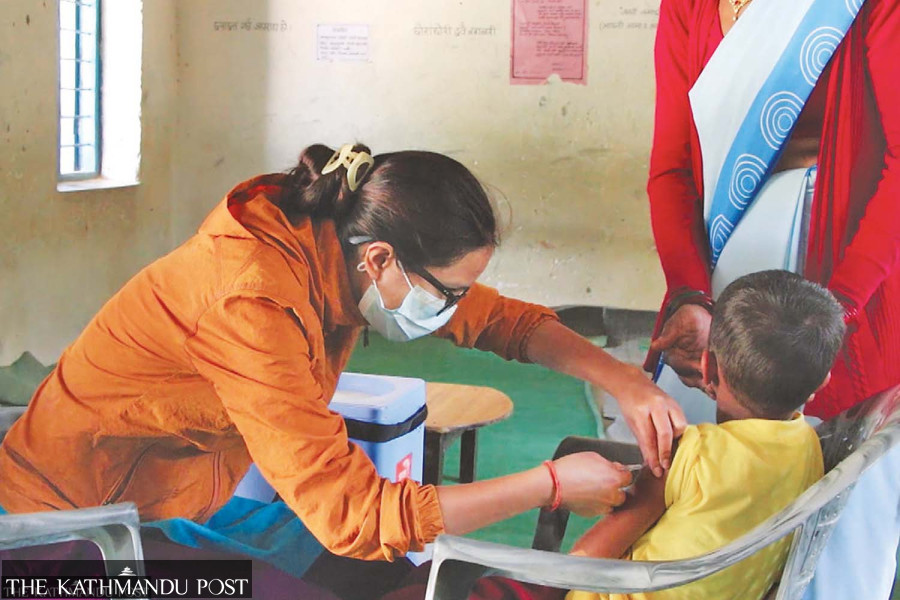Health
Measles-rubella, typhoid vaccination starts in seven Karnali districts today
The measles-rubella vaccine will be administered to all children between six months and 15 years in Jajarkot and Rukum West. Those between 16 and 45 will get typhoid vaccine.
Post Report
Immunisation drive against measles-rubella and typhoid is scheduled to start on Thursday in the seven districts of Karnali Province including quake-affected districts, which are considered highly vulnerable to outbreaks of these diseases.
The Ministry of Health and Population said that vaccines for measles-rubella and typhoid will be administered in Jajarkot and Rukum West, the two districts worst-hit by the earthquake of magnitude 6.4 on November 3.
Officials estimated 150,000 children between six months to five years in Jajarkot and West Rukum.
However, typhoid vaccine will be administered in Surkhet, Jumla, Kalikot, Dailekh and Salyan districts in the 10-day campaign, which will continue until December 30.
“All necessary preparations have been completed to launch vaccination of measles-rubella and typhoid,” said Dr Abhiyan Gautam, chief of the Immunisation Section of the Family Welfare Division under the Department of Health Services. “We urge all people of the eligible age bracket from respective districts to get inoculated with measles-rubella and typhoid vaccines.”
Officials said that they have estimated as many as 600,000 people between 16 and 45 years in the seven districts will be inoculated with the typhoid vaccine.
An additional campaign is being launched in the quake-affected districts and other vulnerable areas, as the risk of disease outbreaks escalate in the aftermath of natural calamities, according to officials.
“Our own experiences show that risks of outbreaks of communicable, vector-borne and other diseases increase in the aftermath of disasters,” said Gautam. “Diarrheal outbreaks were witnessed after the 2015’s mega earthquake, which took lives of around 9,000 people, and injured and displaced thousands in various districts. Moreover, Jajarkot and other districts of Karnali Province regularly witness outbreaks of several diseases—measles-rubella, typhoid, respiratory illness, and diarrheal problems, among others.”
Public health experts have warned of outbreaks of infectious and vaccine-preventable diseases in the quake-hit areas, as thousands of people have been rendered homeless, and the health and hygiene of the displaced people have been compromised. Officials concede that preventing possible outbreaks in the coming days will be challenging, as thousands of people have been forced to live out in the open amid growing cold.
The quake brought down not only houses but also toilets, increasing open defecation and the risk of contamination of water sources, officials say. Jajarkot witnessed the worst diarrhoea outbreak in 2009, in which 111 people died and over 6,000 were infected. The Karnali district also saw an outbreak of cholera in 2014 and 2016.
Earlier, the National Immunisation Advisory Committee, an expert panel, had recommended the Health Ministry launch an additional vaccination drive in the quake-affected and high-risk districts. The expert group also suggested the authorities launch a drive against diseases such as measles and rubella, polio, cholera, pneumonia, and influenza.
At least 154 people died, hundreds were injured and thousands displaced by the magnitude 6.4 earthquake in Jajarkot and West Rukum districts of Karnali Province on November 3. Additionally, over 30 quake-displaced people lost their lives due to cold in the aftermath of the disaster.
The Health Ministry has planned to launch a measles-rubella vaccination campaign in the rest of the districts as well in 2024.
Measles is a highly contagious viral disease transmitted through fluids from an infected person’s nose, mouth or throat. It can be potentially deadly for unvaccinated people.
Nepal had committed to eliminating measles by 2023 after missing the earlier deadline of 2019. To declare measles as eliminated, the number of cases should be less than five per 1,000,000 people throughout the year.
However, the deadly virus was reported in over 14 districts across the country at the start of 2023. At least one child died and hundreds were infected with the disease. The Ministry of Health and Population has now extended the deadline for measles elimination to 2026.
Typhoid fever, usually called typhoid, is also a highly contagious disease caused by Salmonella typhi, which spreads through contaminated food or water. Studies have shown that the disease can be fatal in up to 10 percent of the reported cases.
Typhoid fever is prevalent around the world but the problem is acute in areas where safe drinking water and sanitation are a problem. Nepal has recorded major typhoid outbreaks in the past, but very few cases have been reported in the last few years. As sanitation and hygiene conditions are compromised in quate-affected districts, the risk of an outbreak of typhoid fever is very high, experts say.




 20.22°C Kathmandu
20.22°C Kathmandu














